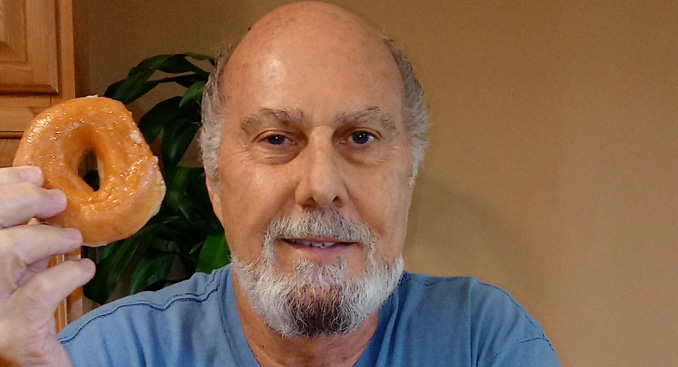- Community & News
- Heart
- Patient Stories
- Service Line
Don’s Story: Expert Care and Minimally Invasive Surgery Reverse Twenty Years of GERD Pain

For twenty years, Donald Hughes had done everything he could to ease the pain of Gastroesophageal Reflux Disease (GERD)—tried every treatment, pursued every cure. It wasn’t helping. In fact, his symptoms were getting worse.
“I did it all. I raised my bed to the correct angle, didn’t eat anything after five p.m., changed my diet over and over again—even went on medication with the dosage going up, up, up. Nothing worked.” Frequently at night, acid reflux would rise into Don’s mouth while he slept, and he’d inevitably breathe it into his lungs. His body’s reaction was immediate and violent.
“I’d wake out of a dead sleep, my lungs and throat burning so badly, I couldn’t catch my breath,” he explains. “All I could do was cough over the sink. I had to have my throat stretched four times, because of all the scarring. And then I’d try a new a different medication, and it would ease my symptoms temporarily…but not for long.”
Finally, he reached out for help—and found Kevin Tymitz, MD, a surgeon with the TriHealth Surgical Institute. After a thorough check-up including an endoscopy and esophageal dilation, Dr. Tymitz identified that Don had a hiatal hernia that needed immediate repair.
“Don’s heartburn had gotten progressively worse,” explains Dr. Tymitz, “to the point where despite maximum treatment with a proton pump inhibitor, he had life-style limiting breakthrough symptoms. After a series of tests, we determined that he had a large hiatal hernia of 8-9 centimeters, and we recommended surgery—laparoscopic repair of hiatal hernia with nissen fundoplication.”
A hiatal hernia means that a portion of the stomach has pushed above the diaphragm and into the chest. To prevent reflux, it is necessary to replace the stomach back into the abdomen, repair the defect in the diaphragm and recreate the natural anti-reflux flap or valve to prevent reflux.
For Don, after two decades of slowly losing the battle against GERD, Dr. Tymitz proved a tremendous ally. “From my first visit to Dr. Tymitz to the surgery, it was only a matter of weeks, and then when we got to the day of surgery, we had a complication. There was a blip on my heart monitor, and they didn’t want to risk it—they needed more tests. Dr. Tymitz was right there. He helped me get the tests I needed as quickly as possible, ensured I wasn’t released so I could be ready for surgery at the earliest opportunity, and called for test results three different times to keep us on track. He went above and beyond the call of duty, and I’ll never forget that.”
For Dr. Tymitz, the approach was all part of his comprehensive approach to patient care. As a fellowship-trained minimally invasive surgeon, he’s dedicated to patient preparation to ensure the best result of any procedure. “The pre-operative workup is very important,” Dr. Tymitz says. “It’s a multidisciplinary approach including close collaboration with gastroenterologists, cardiologists and pulmonologists in some cases, helping us to evaluate the function of patients’ esophagus and stomach, as well as the condition of their heart and lungs.”
Happily, Don was soon cleared for surgery, and the procedure went smoothly. What happened next, however, astounded him.
“I couldn’t believe it. The surgery itself worked perfectly, and then I began the recovery process—I was up and around within a day or so. Though it took few weeks or so before I could eat soft food, and a while longer until I could eat solid food, I haven’t had a single incidence of GERD since the surgery. Not one! And now I can eat anything I want. One of my favorite treats when I was younger was yeast doughnuts, and anything with yeast is no good with GERD. But within three months after the surgery, I was doing so well, I tried a yeast doughnut—best doughnut I ever tasted. And I had no problems whatsoever with it. It’s an absolute miracle.”
Though every patient is unique, Dr. Tymitz advises patients consider the following when they decide to see a specialist:
- If they don’t want to take medication (which can have significant side effects) their entire life
- If, like Don, their symptoms of GERD are worsening despite medication
- If they have ever been diagnosed with Barrett’s Esophagus, a precursor to esophageal cancer
- If they have ever been diagnosed with a hiatal hernia
For Don, seeking the assistance of a specialist made all the difference. “For twenty years I lived with GERD every day. You don’t realize how much it impacts every part of your life until suddenly—it’s gone. It’s the best feeling in the world.”
Related Articles
- Health & Wellness
- Primary Care
- Service Line
- Women's Health
- Community & News
- Heart
- Patient Stories
- Service Line
- Treatments